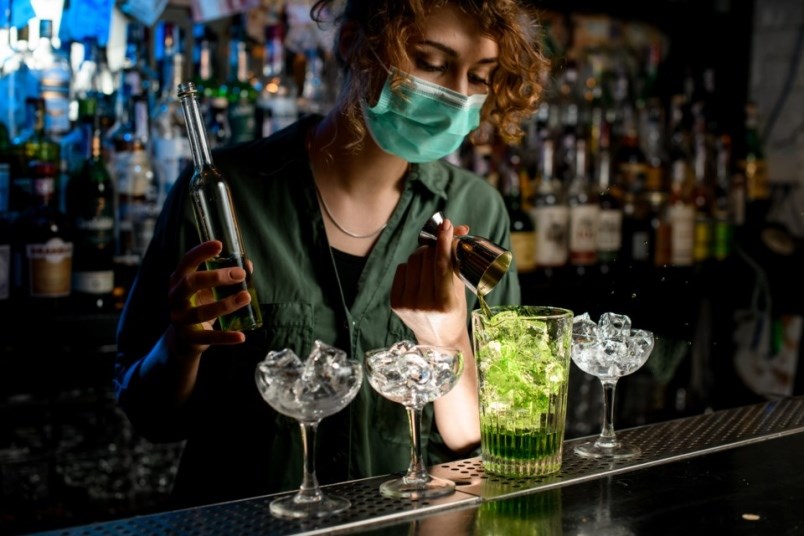B.C.’s restaurant sector has a simple, direct response to the Provincial Health Officer Bonnie Henry’s decision – announced only one day ahead of time – to ban alcohol sales from 8 p.m. on New Year’s Eve to 9 a.m. the next day.
“We are profoundly disappointed because she has left a trail of disaster by making this decision,” said Ian Tostenson, president/CEO of the BC Restaurant and Food Services Association. “The decision was arbitrary, and the timing of it is terrible because it’s going to cost hundreds of thousands of dollars – if not millions. And it was unnecessary.
“Shame on Dr. Henry this time,” he concluded.
The ban was announced in a hastily called news conference on Wednesday afternoon – a day where provincial officials previously said they would have issued a press release for its daily COVID-19 update rather than holding a press briefing.
Instead, Henry and B.C. Health Minister Adrian Dix announced the ban at the event roughly 29 hours before it was to come into effect. The ban’s purpose, Henry said, is to decrease the late-night consumption of alcohol that leads to “risky behaviour” such as table-hopping and social gatherings outside of individual households – which, Henry said, has been proven to aid the spread of COVID-19.
Tostenson said that the announcement caught the entire industry by surprise because there was “zero consultation” from the province that this ban was under consideration.
“We all knew it’s going to be New Year’s Eve tomorrow; it’s not new,” he said. “We could have thought about this ahead of time. Industry could have worked with Dr. Henry to develop a plan... This didn’t need to happen.”
At the press conference, Henry said in response to a question about the last-minute nature of this decision that the NYE alcohol sales ban was actually under consideration “for some time” and that she felt it was something that needed to be done given what she has seen and heard about people’s New Year's celebration plans.
She added the 8 p.m. time was actually decided upon with restaurants in mind.
“I know that many restaurants are planning two sittings, and the second sitting usually happens at around 7 to 7:30 p.m.,” Henry said. “So this does give people the opportunity to order wine with their meals... We tried to time it so that restaurants can have two sittings and provide food service, so we hope it’s not going to impact those restaurants who are doing a great job of keeping people safe.”
That explanation, however, does not fly with Tostenson or B.C.’s restaurant owners.
“In a lot of restaurants, 7:30 p.m. is the first sitting,” Tostenson said, adding that most restaurants have second sittings around 8 p.m. or later – past the newly imposed deadline.
One easy solution, he countered, would have been to set the deadline one hour later at 9 p.m. to cover the vast majority of restaurants’ second sittings – something that restaurant owners would have told Henry and the province if given the chance.
“We have a restaurant downtown that has reservations for 500 people – mostly couples - spread out over two sittings for NYE,” Tostenson said. “The second sitting starts at 8 p.m., and now they are calling guests to get everyone to come in an hour earlier. That won’t work with a lot of guests, so we can see as many as 50% cancelling. If you consider an average of $100 per table – and that’s a pretty light NYE bill – you have just cancelled about $25,000 in sales at just one restaurant.
“If we kept alcohol sales open until 9 p.m., that same restaurant would have been able to retain roughly 80% of their business on that night. That’s how simple it was with just a one-hour difference; but Dr. Henry doesn’t know that because she doesn’t run restaurants. Had we collaborated with Dr. Henry, we would have been able to explain it to her.”
Henry, for her part, said the 8 p.m. time is set in stone.
“Food is perfectly fine, but last call needs to be at 8 o’clock,” she said. “... What we are concerned about is the people who want to stay out later and consume alcohol – which leads to behaviours that would put restaurants and other patrons at risk.”
Tostenson remains miffed, however, that no one from Henry’s office or the province gave the industry any direct contact – even on Wednesday, the day of the announcement. With Henry noting she is already eyeing potential issues with upcoming gathering dates like St. Patrick’s Day, Tostenson said what happened this time cannot happen again.
“Unless you want the entire industry to go insolvent, you can’t have 24-hour decisions going forward,” he said. “If we had a chance to consult with the province weeks ahead of time, Dr. Henry may have still said it has to be an 8 p.m. deadline. In that case, we can at least tell people that – for reasons that we understand – the industry will comply. And that still gives us two or three weeks to plan.
“Now, things are in chaos. We fully support the health objectives, and we’ve always supported Dr. Henry. But this could have all been avoided by simple consultation with an industry that’s determined to do the right thing.”



